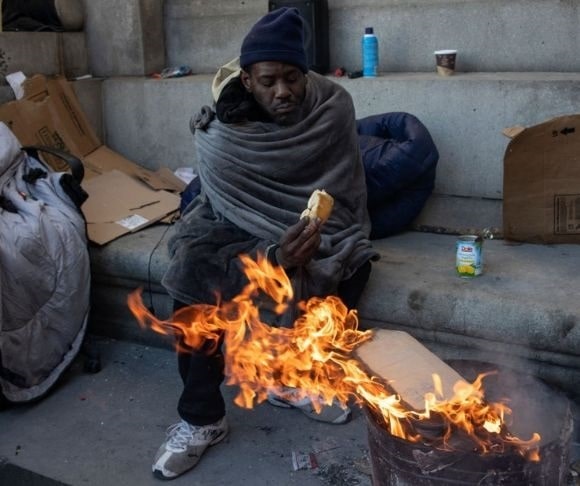The good people of the Big Apple might have another state government policy causing angst for the residents of the boroughs and neighborhoods sprinkled across the archipelago. The Fair Chance for Housing Act would “prohibit housing discrimination in rentals, sales, leases, subleases, or occupancy agreements in New York City, based on arrest record or criminal history.” This is from the same NYC council that allowed Mayor Eric Adams to direct local authorities to detain and commit anyone they deem a danger to themselves and others – with a focus on the mentally ill homeless.
There seems to be a disconnect between the NYPD and the City Council.
 New York City appears to be suffering from the mental malady known as “manic,” as policy decisions made by the city council swing from very progressive to draconian. Imagine the whiplash the New York Civil Liberties Union (NYCLU) is experiencing.
New York City appears to be suffering from the mental malady known as “manic,” as policy decisions made by the city council swing from very progressive to draconian. Imagine the whiplash the New York Civil Liberties Union (NYCLU) is experiencing.
Living Next Door to an Ex-Con?
Rest assured; if folks are deemed mentally ill, they can be plucked off the streets, stuffed into psychiatric holds, and given medication. But not the convicted and potentially dangerous people who, having served their time, might want to hang their hat in the rowhouse next door. And if the act passes, complaining will likely fall on deaf ears.
Mayor Adams spoke to reporters after 2022 crime stats were made public and pointed directly at the formerly incarcerated for the rise: “We have about 1,600 people in this city that are recidivists. They are dangerous, they are continually committing crimes over and over again, and we must zero in on them to send the right message that our criminal justice system is going to handle them accordingly.”
The proposed policy does have an informative webpage to reference. As one might surmise, the supporters’ list is mostly non-profit groups: Catholic Migration Services, Center for Alternative Sentencing & Employment Services, Drug Policy Alliance, and NYCLU. Well, you get the gist. But does the policy make sense? Public Advocate Jumaane D. Williams warns that 750,000 city residents have criminal records. Therefore, counting family members, “millions are impacted,” he explained. Speaking during the Dec. 8, 2022, public hearing, he stated:
“According to a report by the Prison Policy Initiative, formerly incarcerated people are nearly ten times more likely to be homeless than the general public. For far too long, there has been no protection for New Yorkers whose housing applications have been denied due to criminal records.”
But reports issued by the US Census Bureau, Homeless Outreach Population Estimate, contradict Williams’ discourse. Records indicate that around 3,400 people live on the streets. And the NYC Department of Homeless issues a daily report showing 69,421 people in city shelters as of this writing: that would be about one-tenth of what the policy is using as validation. The Census numbers suggest residents with a criminal record or incarceration are doing okay in getting a place to live if they can prove they have a stable job and can make the rent.

(Photo by Andrew Lichtenstein/Corbis via Getty Images)
Attempting to reinstate formerly incarcerated individuals into society has been on the national agenda for years. Part of the housing issue stems from the lack of a good-paying job. And that’s where the “ban the box” legislation evolved: making it illegal to judge a person’s record for a position in the federal government. Thirty-seven states have adopted laws or policies for employment in the public sector. The National Employment Law Project has also done its math. “Tallying up the population of the states and localities that have adopted a fair-chance law or policy, over 267 million people in the United States — more than four-fifths of the US population — live in a jurisdiction with some form of ban-the-box or fair-chance policy,” its webpage states.
The lack of money is the biggest hurdle to finding a place to live. Can the two movements go hand-in-hand?
Not in My New York City Backyard
Of course, there are opponents of the new bill. Some say this policy is simply punitive to property owners. One council member opposed to the law has been publicly vocal about protecting the landlord’s rights. “This is a very dangerous bill that would harm mostly law-abiding New Yorkers,” said Inna Verkinov while speaking at a protest rally. “We cannot support a bill that would strip a property owner from their right to know if a murderer or drug dealer will move onto their property.”
Rachel Miller-Bradshaw, the Democratic State Committee Woman for Assembly District 78, also questions the proposed policy. She argues that if landlords cannot do a criminal background check, they may resort to racial profiling – and more people will find themselves on the streets:
“This is going to lead to more discrimination. Absent a criminal background check, landlords and co-op boards around the city are bound to revert to a pattern of racial profiling under the façade of protecting their current tenants, shareholders, and property.”
With the Fair Chance for Housing Act, New York isn’t the first jurisdiction to take a shot at the most shameful problem the United States seems to ignore. The Big Apple could join New Jersey, Seattle, and San Francisco in curtailing the ability of landlords to vet applicants’ criminal histories.
New York City could use a little help in getting its homeless out of the subways and into some form of housing — whether a mental institution, halfway house, or apartment. The city’s Department of Homeless, which boasts “2,000 employees, with an annual operating budget of over $2 billion” and “one of the largest organizations of its kind,” can’t quite get the job done.




